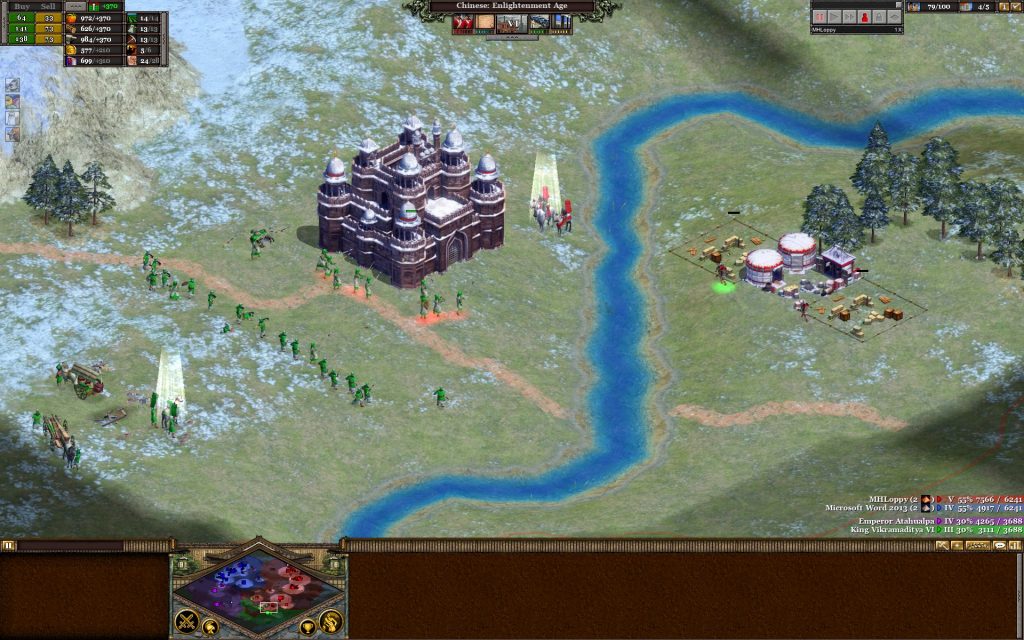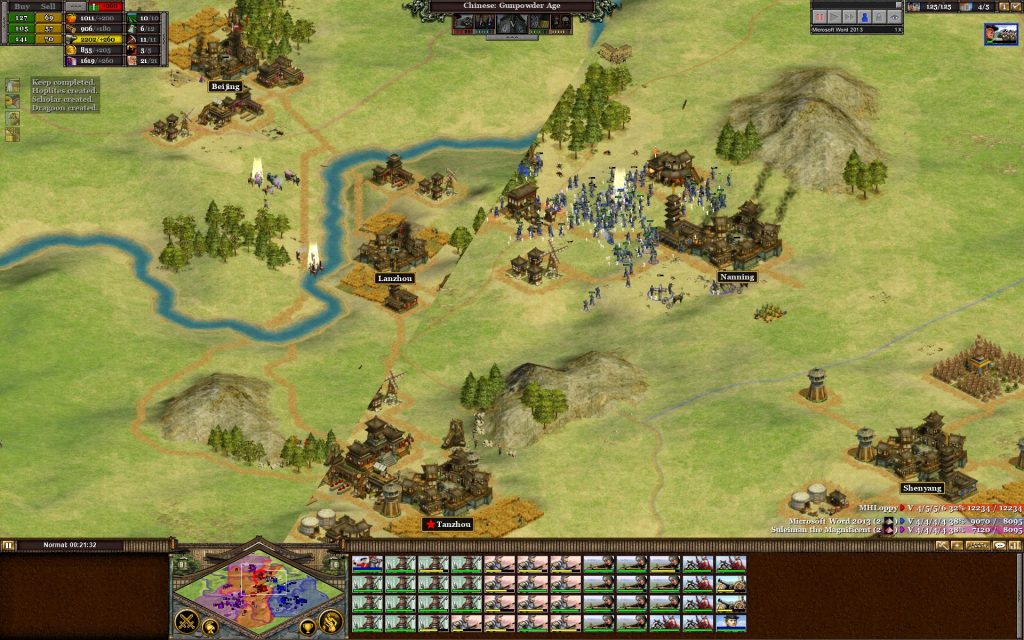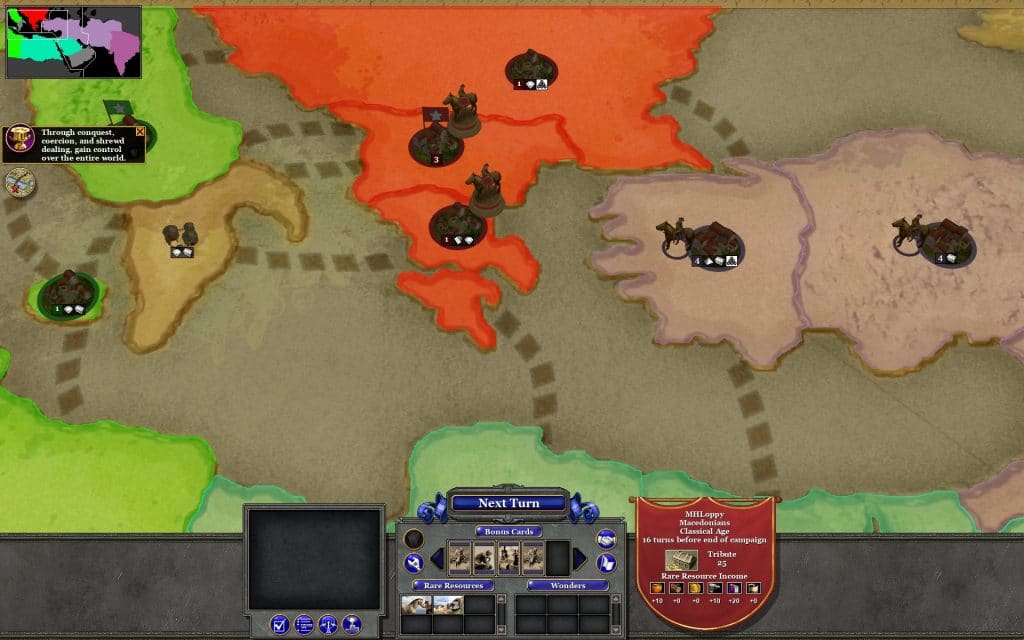Apparently I’m an anomaly.
As of writing this article, I have played only three games of Rise of Nations against human opponents other than my friends. Crucially important in this distinction is that my friends are all less experienced players than me: the friend I have played against the most started playing the game just two months ago. I helped him learn basic economic optimisations (don’t rush a temple on your first city there friendo), serviceable army compositions (anti-tank rifles when facing completely infantry: never again), and other core game concepts.
Until two months ago, I had only played against a human opponent in Rise of Nations once or twice.

My lack of experience against a dynamic human opponent had lead to me being fairly good at abusing some of the AI’s deficits, but inflexible in other areas. My go to strategy — which I would use in very nearly every game — was rapid economic expansion, transitioning into a greedy turtle, with military units being produced only once my opponent began to march on my cities / forts.
I didn’t harass, I didn’t make the first offensive move, and I certainly didn’t play the game at all optimally.

A Change in Circumstances
Last year my friend(s) and I played 2v2 and 3v3 games against all-AI teams, depending on who was available to play at the time. Towards the end of this period, the fact that we only played “Co-op vs AI” was mostly because the others in the group weren’t interested in facing off against each other. I was keen to try it, but with no opponent available I was stuck with what we had. It was fun for a while, but grew stale over time. Eventually I wasn’t enjoying the games enough to warrant playing them, and I shelved Rise of Nations.
Fast forward around a year and another friend expresses an interest in playing – and unlike the others, he was open to playing PvP matches. The problem was that he was completely new to the game, having never played Rise of Nations before then.

After a while of him playing single player 1v1s, and then the two of us repeating the 2-vs-AI structure of old, we began experimenting with PvP team compositions.1 At around this time, New Player was able to (just barely) face off against a Tough AI in a 1v1, so he had gotten into “decent” territory by my standards. We settled on a team composition that seemed pretty fair to both of us: he would pair with a Tough AI and I would 1v2. Despite our agreeance that the teams seemed approximately balanced, things did not go as expected.
A few were close, but after dozens of these games I had not actually lost a single time.
Even in the closest match out of all of them — where I actually opened up the menu and pondered resigning — I was able to claw back from an extreme deficit and eventually push back on and destroy both attacking armies.

I felt I had close to plateau’d as a player at around this point. Managing lots of things simultaneously is generally not something I’ve ever considered my strong suit, and I already knew all the game’s mechanics. It wasn’t as though I felt that I couldn’t improve at all, but I figured it’d be pretty slow going, which would allow my friend to close the relative size of the skill gap between us over time.
Alas, my friend seemed to reach his plateau far earlier than I had anticipated, and when I watched replays of our games, I began seeing the same mistakes cycled through over and over again. Despite his reassurance that he “got it” when we would briefly discuss areas of improvement after each game, I began to notice that he would improve in an area for only a short while (if at all), then fall back upon bad habits. It’s not as though this guy is just bad at games in general either: he previously reached Master Tier in League, and was the primary shot-caller in our now-defunct amateur team. I’m not sure why these cyclical habits were such a problem, but they made it difficult to scratch my itch for a competitive fight.
In any case, my time playing with and against him gave me the sandbox I needed to extend beyond my turtle strategy into experimenting with things like rushes and light harassment. Given that I was always outnumbered, I was still instilled with a conservative game plan most of the time, but it was a departure from my old style nonetheless. Combined with some lessons reinforced by trudging through the Alexander campaign on Toughest,2 my toolbox of strategies and tactics was at an all time high. No longer was I only an accomplished turtler.

A New Challenger Approaches
At this point, I was itching to find players that would provide a more compelling fight. If there’s no “figuring out” required in a strategy-based game, it all but devolves into a glorified clicker game. As it turns out, someone on a recently-joined Discord server reached out to me asking if I wanted to play a match against him. This was exciting.
Better yet, this guy seemed really good. At one point prior he had mentioned that he had to play with the setting that hides player scores during the game – otherwise his opponent would resign early into the game simply because they could see they were losing so badly already. He could keep up with conversations about the game, even when specific units or concepts were being discussed.
When we loaded up the game, I was ready to have my ass kicked.
Our first game was close. Very close. The game went right up to the Information Age (Age 8) – the final stage of the game.3 There were some strategic outplays on each side, but ultimately I lost despite both of us thinking that I had managed to secure the win. Each of us had forgotten (at least temporarily while busy in combat and economy management) the outcome of an uncommon situation involving delaying capital timers. We made plenty of other mistakes too, but overall seemed to be somewhat evenly matched, especially given the result of the game.
Later on while I was reflecting on the game, I began to question if I was actually better than I thought I was. There were lots of problems with how I had played, but only a couple of them seemed glaringly bad to me. Despite his eventual victory, that reflection made me feel like I had overestimated my opponent’s capabilities. He had made just as many glaring mistakes, I just hadn’t noticed some of them at the time.
We rematched for two more games yesterday, except this time he wanted to go with randomised nations. As a long-time Chinese only player, this idea honestly scared me a little. All my build orders would have to change. The research priorities I was used to would be wrong. Unit compositions would need to be different.

Random Nation left me playing Americans in the first game and Bantu in the second.
I won the first game in Gunpowder Age (Age 4).
I won the second game in Medieval Age (Age 3). My opponent was still in Classical Age (Age 2).
If we play more, I’m genuinely thinking I would win most of the time. I’ve already figured out how to start an earlier offensive, and apparently I can utilise unfamiliar nations far better than either of us expected.
So Apparently I’m an Anomaly
I went from “essentially no PvP experience” to besting a seasoned veteran in just an hour or two of game time. That’s really weird. Obviously I had some amount of practise against my friend (New Player) but given that I was teaching him from scratch I wouldn’t expect that to result in much skill improvement on my end. Players in a vacuum tend to do poorly when exposed to the greater playerbase, because they lack diversity in their experience.
Having high level experience in another game certainly helps, but I still find the result unusual. If I went and played against clan-level players, I do suspect I would be consistently bested – but to reverse the comparison: you wouldn’t expect a high-level Rise of Nations player to be bested only by high-Diamond League of Legends players if they started to play ranked solo queue.
Somehow I managed to figure out how to play the game to a very high level with only seemingly limited external influence. I’m not sure if that’s a statement about my ability to reflect and improve, but I’m certainly enjoying the result.
- A couple of other friends (including one from the previous vs-AI games) hopped in for a game here and there, but ultimately it was just me and New Player most of the time.
- I had previously dismissed the campaign as a massive grind-fest, but after playing through it I found it unexpectedly insightful from a high-level strategic point of view.
- My history of turtling followed by being outnumbered has lead to a slow and generally conservative play style, and I honestly wasn’t experienced with closing out games before late game.